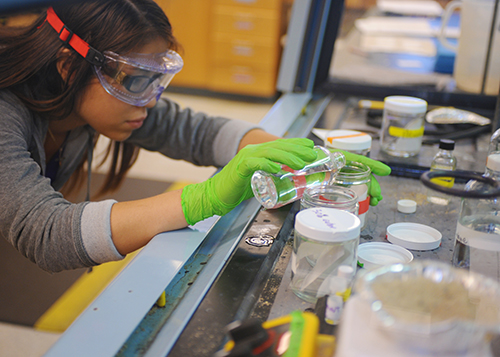Why Choose Cosmetic Engineering?
This specialized option in cosmetic engineering brings together a unique set of courses designed specifically to prepare chemical engineering graduate students for a successful entry into this highly competitive and rapidly growing industrial sector.
Our graduates have gone on to work for top cosmetic companies, including:
- Revlon
- Avon
- Estee Lauder
- L’Oreal
New York City Location
Our New York City location provides opportunities for students to use the city as their classroom - visiting sites, speaking with successful alumni who work in the industry, as well as applying for internships at major cosmetic companies.
What Will You Learn?
Cosmetic and consumer products are complex fluids and soft solids that require in-depth understanding and control of the formulation- microstructure- processing-performance linkages, in order to develop and produce highly optimized and differentiated products. This requires specialized knowledge in colloids, surfactants, polymers in addition to an understanding of the rheology, tribology and advanced processing of these complex fluids. Additionally, an understanding of the environmental, regulatory, safety and compliance aspects play a critical role in building up the skills set for a successful entry to this rapidly growing industrial sector.
Coursework
For the cosmetic engineering option, graduate students will need to take four courses from the following five options:
- Emulsion & Polymer Technologies (CHMG 737)
- Formulations I (CHMG 758)
- Formulations II (CHMG 759)
- Advanced Processing Techniques (CHMG 753)
- Industrial Regulation and Quality (CHMG 751)
In addition, students are expected to pick a graduate design
project within the cosmetics field. This unique hands-on
program creates an engineer with all the tools critical to the
industry and in many cases will be done in conjunction with an
industry partner.
Laboratory Component
An essential component to the option in cosmetic engineering is the hands-on approach to building formulation and the advanced characterization expertise of the students. Both the Emulsion & Polymer Technologies course and the Formulations Course will have an experimental component. Experimental Skills will be built in the following:
- Particle Sizing and DLS
- Surface Tension
- Microscopy
- Rheology (Viscometry-Flow Curves, Thixotropic Loop Tests, Yield Stress Measurements, G’, G” Frequency Sweeps, G’ curing experiments)
- Interfacial Rheology
Faculty
The affiliated faculty are world-leading experts in the application of chemical engineering, colloid and interface science, environmental engineering and bioengineering for developing and manufacturing the next generation of cosmetic products.
Meet the Faculty
